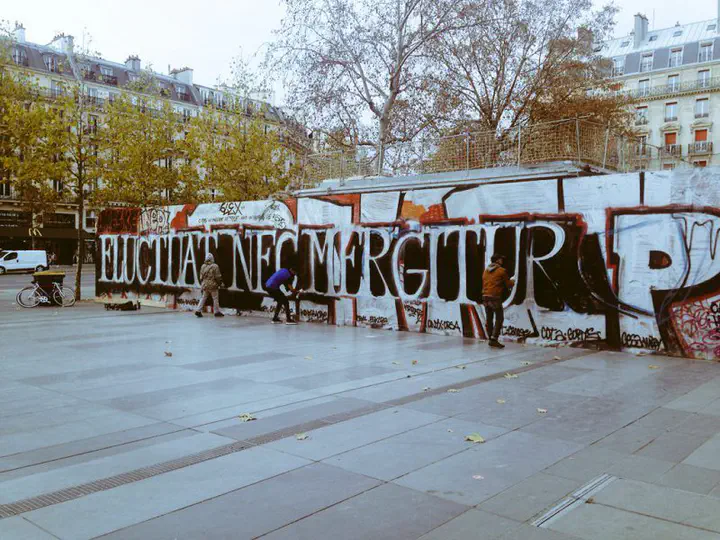COP21: The Anchor to the Storm in Paris
 The Paris motto is painted on the Place de la République following the shootings in the capital (credit @LucieSoullier)
The Paris motto is painted on the Place de la République following the shootings in the capital (credit @LucieSoullier)
This post was originally written for the EnvEast Doctoral Training Partnership student blog. EnvEast is a collaboration between three UK universities, including University of East Anglia where I am carrying out my PhD. The blog can be found here
“Fluctuat Nec Mergitur”
“Battu par les flots, mais ne sombre pas. Tossed by the sea, but not sunk.”
The centuries-old motto, which appears on the French capital’s crest, has been a central rallying cry in the wake of the Paris attacks. Public figures have reiterated its message in the last days, emphasising the need to resist and come together in the face of unimaginable adversity.
Paris and the international community have an opportunity to do just that in less than a fortnight. The COP21 has already been branded as the most important environmental conference of our lifetimes. Its significance is doubled now, as the Executive Secretary of the UNFCCC (United Nations Framework Convention on Climate Change) stressed.
Of course #COP21 proceeds as planned. Even more so now. #COP21 = respecting our differences & same time acting together collaboratively.
— Christiana Figueres (@CFigueres) November 15, 2015
The COP however is linked to this tragedy in more ways than one.
Merely 24 hours after the attacks, Bernie Sanders stated at the American Democratic presidential debate that “Climate change is directly related to the growth of terrorism”. While evidence is still lacking to fully support that claim, recent studies have looked at how climate impacts can exacerbate existing political instabilities (Kelley et al., 2015).
A positive result to climate change negotiations at the end of November would however also serve as a more direct response to terror. And this response is needed. As I am writing this post, France is still in national mourning and anxiety can very much be felt in the streets.
As a French national and a PhD researcher in future flood risks, I can’t help but find meaning in both the literal and figurative sense of “Fluctuat nec mergitur”. Resilience has become a key word in climate change science and adaptation policy. Yet it is worth noting the term has its roots in psychology and can be applied just as much at the societal level as to the individual. It represents the capacity to cope and bounce back from extreme events, the ability to weather the storm…to be tossed by the sea, but not sink.
In his already historic speech to the French Parliament on Monday, President Hollande reminded that the COP21 was to be a moment of “hope and solidarity”. It will also be a fight for collective knowledge and against obscurantism. Country representatives have an even greater responsibility now and perhaps after December 11th, anyone affected by terrorism can start to keep their heads above water.
 |
|---|
| Minute’s silence on the University of East Anglia campus |